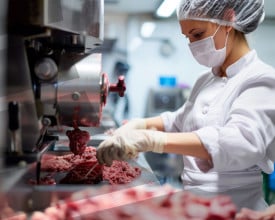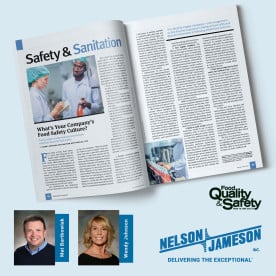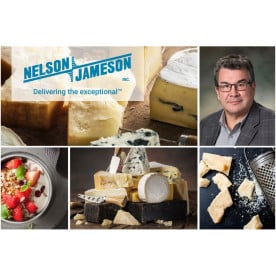Monthly Archives: October 2015
- October 28, 2015The 2015 trade show season is coming to a close...one of our final shows is the Dairy Practices Council (DPC) Annual Conference in Burlington, Vermont, November 4-6.
- October 21, 2015
Nelson-Jameson, Inc. and DSM are proud to announce a new Delvotest® Antibiotic Residue Tests website! Geared towards meeting the needs of dairy farmers, dairy labs, and artisan/farmstead operations, the site features information on an array of kits, troubleshooting tips, and order links.
As part of our mutual commitment to food safety, Nelson-Jameson, Inc. and DSM sought to create a site where users in the Americas could learn more about the dangers of antibiotic residues in milk and how to most effectively select and utilize Delvotest® products to both protect the public health and the economic vitality of their dairy/cheese operations.
To check out the Delvotest® site you can click here, enter “nelsonjameson.com/delvotest” into your web
- October 14, 2015
MARSHFIELD, WIS., October 8, 2015 - Nelson-Jameson — one of the largest distributors to the US cheese production market — and its sister company Kaestner LLC — a field service, PM programs, and project solutions provider — are entering a strategic partnership with Valcour Process Technologies. Valcour specializes in offering process technologies, equipment, systems, lines, and project solutions for the cheese, yogurt, and dairy production markets.
Valcour will be working directly with the sales teams at Nelson-Jameson and Kaestner to expand their market reach and breadth of offering to customers. Kaestner will also offer services, spare parts, and preventative maintenance programs to Valcour to better serve their customers.
All three companies will work together to provide better solutions to cheese manufacturers.
Nelson-Jameson, Inc. has been an integrated supplier for the food industry since 1947. Product lines include safety & personnel,
- October 14, 2015
MARSHFIELD, WIS., October 8, 2015 - Nelson-Jameson — one of the largest distributors to the US cheese production market — and its sister company Kaestner LLC — a field service, PM programs, and project solutions provider — are entering a strategic partnership with Valcour Process Technologies. Valcour specializes in offering process technologies, equipment, systems, lines, and project solutions for the cheese, yogurt, and dairy production markets.
Valcour will be working directly with the sales teams at Nelson-Jameson and Kaestner to expand their market reach and breadth of offering to customers. Kaestner will also offer services, spare parts, and preventative maintenance programs to Valcour to better serve their customers.
All three companies will work together to provide better solutions to cheese manufacturers.
Nelson-Jameson, Inc. has been an integrated supplier for the food industry since 1947. Product lines include safety & personnel,
- October 08, 2015
Navigating the world of lubricants in the food industry involves considering NSF ratings, a crucial aspect in ensuring compliance with safety standards. Understanding these ratings is essential for making informed choices in various applications. The H1 rating designates lubricants suitable for incidental food contact, allowing use in and around food processing areas. These lubricants can protect against rust, act as release agents, and serve as machine lubricants with minimal exposure to food. On the other hand, H2-rated lubricants are intended for areas with no potential contact with edible products. Meanwhile, the 3H rating applies to release agents or direct food contact, particularly on surfaces in contact with food during processing. Some lubricants can hold both H1 and 3H ratings, offering versatility. For detailed guidance on selecting the right lubricant for your application, our Lubricant Specialists are ready to assist you at 800-826-8302.
- October 07, 2015
Nelson-Jameson, Inc. began as a dairy-centric business almost 70 years ago and, while we’ve since branched into all sectors of the food and beverage processing industries, we still consider ourselves experts in all-things-dairy.
Global dairy consumption is expected to grow by 36% in the next decade, largely driven by emerging markets. To satisfy this demand and other culturally-based needs, consumers and processors are looking beyond the traditional dairy cow to other milk-producing animals such as camels, goats, sheep and buffaloes.





